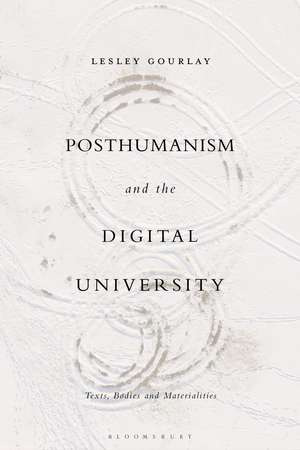Posthumanism and the Digital University: Texts, Bodies and Materialities
Autor Dr Lesley Gourlayen Limba Engleză Hardback – 9 dec 2020
| Toate formatele și edițiile | Preț | Express |
|---|---|---|
| Paperback (1) | 196.71 lei 43-57 zile | |
| Bloomsbury Publishing – 29 iun 2022 | 196.71 lei 43-57 zile | |
| Hardback (1) | 655.67 lei 43-57 zile | |
| Bloomsbury Publishing – 9 dec 2020 | 655.67 lei 43-57 zile |
Preț: 655.67 lei
Preț vechi: 942.64 lei
-30% Nou
Puncte Express: 984
Preț estimativ în valută:
125.46€ • 131.34$ • 103.81£
125.46€ • 131.34$ • 103.81£
Carte tipărită la comandă
Livrare economică 07-21 aprilie
Preluare comenzi: 021 569.72.76
Specificații
ISBN-13: 9781350038172
ISBN-10: 1350038172
Pagini: 200
Dimensiuni: 156 x 234 mm
Greutate: 0.45 kg
Editura: Bloomsbury Publishing
Colecția Bloomsbury Academic
Locul publicării:London, United Kingdom
ISBN-10: 1350038172
Pagini: 200
Dimensiuni: 156 x 234 mm
Greutate: 0.45 kg
Editura: Bloomsbury Publishing
Colecția Bloomsbury Academic
Locul publicării:London, United Kingdom
Caracteristici
A fresh perspective on how digital technologies are changing the experience of students and the nature of knowledge in higher education, using the concept of the 'posthuman' to understand how people, objects and texts interact
Notă biografică
Lesley Gourlay is Professor of Education at IOE, UCL's Faculty of Education and Society, University College London, UK.
Cuprins
Introduction1. More Than Human2. Matter3. Body4. Presence5. Interfaces6. Wayfaring7. Quantum8. Document9. Conclusions, or So What?ReferencesIndex
Recenzii
A robust and refreshing contribution to digital and posthuman scholarship ... In its ambition and skill, Gourlay's book will appeal to researchers and practitioners interested in the increasing digitalization and datafication of higher education.
Posthuman and new materialist ideas provide fertile and underexplored terrain for examining the contemporary university through in-depth engagement with 'the fine-grained, detailed "nitty-gritty" of everyday higher education as it unfolds, in a mesh of bodies, nonhuman actors, and technologies' (19). As such, this is a book that should be of interest to anyone who wants to understand what actually happens in universities today.
This book undeniably provides both the inspiration and means to bring posthumanism 'down to earth', and to shine a much-needed critical light on the corridors and conduits of the digital university.
A very interesting and provocative take on the idea of what it means to be a "text-consuming humanist" in these digital times we are now living in. Gourlay poses great questions for future thought and implications.
This book shifts discussions of digital learning in tertiary education in significant ways, arguing that notions of disembodied, 'virtual' interactions overlook the material entanglements of people, knowledge practices, texts and artefacts. Flipped classrooms, online learning and other recent trends are reactionary rather than revolutionary developments. Challenging the idea of the individual human subject engaged in isolated study, Lesley Gourlay presents an absorbing alternative vision of digital epistemic practices seen through a more-than-human lens.
Posthuman and new materialist ideas provide fertile and underexplored terrain for examining the contemporary university through in-depth engagement with 'the fine-grained, detailed "nitty-gritty" of everyday higher education as it unfolds, in a mesh of bodies, nonhuman actors, and technologies' (19). As such, this is a book that should be of interest to anyone who wants to understand what actually happens in universities today.
This book undeniably provides both the inspiration and means to bring posthumanism 'down to earth', and to shine a much-needed critical light on the corridors and conduits of the digital university.
A very interesting and provocative take on the idea of what it means to be a "text-consuming humanist" in these digital times we are now living in. Gourlay poses great questions for future thought and implications.
This book shifts discussions of digital learning in tertiary education in significant ways, arguing that notions of disembodied, 'virtual' interactions overlook the material entanglements of people, knowledge practices, texts and artefacts. Flipped classrooms, online learning and other recent trends are reactionary rather than revolutionary developments. Challenging the idea of the individual human subject engaged in isolated study, Lesley Gourlay presents an absorbing alternative vision of digital epistemic practices seen through a more-than-human lens.
